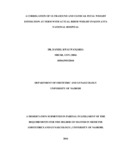| dc.contributor.author | Wanjaria, Daniel K | |
| dc.date.accessioned | 2017-12-14T12:29:25Z | |
| dc.date.available | 2017-12-14T12:29:25Z | |
| dc.date.issued | 2017 | |
| dc.identifier.uri | http://hdl.handle.net/11295/101946 | |
| dc.description.abstract | Accurate estimation of fetal weight is of paramount importance in the management of labour. Some cases of maternal morbidity and mortality as well as perinatal morbidity and mortality can be prevented by antepartum and intrapartum fetal weight estimation especially in the extremes of weights. (1). There is need therefore to have an easy and accurate method of fetal weight estimation. This study was conducted to correlate the accuracy of ultrasound and clinical methods of fetal weight estimation.
Ultrasound and clinical fetal weight estimation are two main methods used in our setting and are of significant importance in both reducing maternal and perinatal mortality and morbidity, therefore contributing to achieving MDGs 4& 5. Ultrasound services are not readily available in low resource countries. Therefore validation of clinical method of fetal weight estimation was necessary.
Objective
To determine the correlation of fetal weight estimation at term by clinical and ultrasound methods with actual birth weight in KNH.
Methodology
This is a cross-sectional hospital based study at KNH. A cross-sectional of one hundred and two women admitted at term for elective caesarean section delivery. Each participants had fetal weight estimation by clinical and ultrasound method and this compared with the actual birth weight after delivery.
Results
The study participants had a mean age of 28.7 years and an average parity of 2.4. All had attended antenatal care with 9% reporting minor complications. Majority (85%) of the new-borns had birth weights between 2500 and 3999 grams. The mean actual birth weight (3298.8 grams) was significantly different from the estimated mean fetal weight from ultrasound (3394.3 grams) and the clinical method(3338.6 grams), p<0.001. Both methods had high accuracy (AUC>0.9) in estimating fetal weight however, clinical method had a higher sensitivity (98.8%) compared to ultrasound (97.6%).
Conclusion
We conclude that although there is no significant statistical difference in clinical estimation method and ultrasound estimation technique, clinical estimation appear superior to ultrasound fetal weight estimation in all weight categories.
Recommendation
Clinical method should be encouraged in estimation of fetal weight where decisions based on fetal weight are required. | en_US |
| dc.language.iso | en | en_US |
| dc.publisher | University of Nairobi | en_US |
| dc.rights | Attribution-NonCommercial-NoDerivs 3.0 United States | * |
| dc.rights.uri | http://creativecommons.org/licenses/by-nc-nd/3.0/us/ | * |
| dc.subject | A Correlation of Ultrasound and Clinical Fetal Weight | en_US |
| dc.title | A correlation of ultrasound and clinical fetal weight estimation at term with actual birth weight in Kenyatta National Hospital | en_US |
| dc.type | Thesis | en_US |
| dc.description.department | a
Department of Psychiatry, University of Nairobi, ; bDepartment of Mental Health, School of Medicine,
Moi University, Eldoret, Kenya | |



